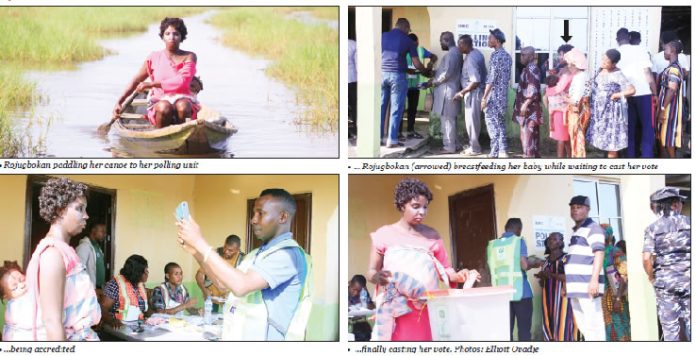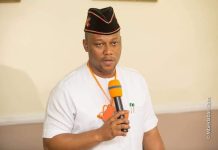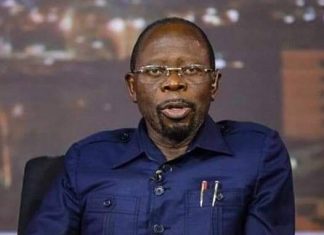

Despite the challenges facing indigenous people of the riverine areas, several Ilaje women paddled their way out of the creeks and mangrove forests to vote at the just-concluded Ondo State governorship poll, in anticipation of a better future, writes photojournalist ELLIOT OVADJE, who covered the election
The first light of dawn glimmers on the still waters of the Obeuhi community in Ondo State. Blessing Rojugbokan, a 37-year-old mother, carefully places her infant on her back, securing the child with a wrap before stepping into her wooden canoe.
With practised hands, she grips her paddle and begins the journey to Obenla, where she plans to cast her vote at Ward 4, Unit 006 of the governorship election.
For Rojugbokan, this isn’t just a trip to a polling station; it’s a journey of determination and hope. Living in the remote riverine areas of Ilaje Local Government Area of the Sunshine State, she is deeply aware of the challenges her community faces daily.
Community often forgotten
The riverine areas of Ondo State are breathtakingly beautiful but deeply isolated. Communities like Obeuhi, Ayetoro, Obenla and others rely on fishing and subsistence farming for survival. Canoes are the primary mode of transportation, as there are no motorable roads connecting them to urban centres.
This geographical isolation has contributed to years of neglect. Basic infrastructure such as schools, healthcare centres, and proper housing is either inadequate or absent. Seasonal floods exacerbate these challenges, frequently displacing families and destroying livelihoods.
Ilaje Local Government Area occupies the coastal area and is bounded on the south by the Atlantic Ocean. As such, in the extreme south of the communities, the undulating lowland surface is covered by silt, mud and superficial sedimentary deposits.
Ilaje communities are vulnerable to extreme weather conditions, including floods, drought and rise in sea levels, which owe its cause to a complex of factors, among which anthropogenic activities are paramount.
The rich coastal line of mangrove swamp enhances the beauty of this area but following devastating ocean surges and floods, as well as crude oil exploration by multinational corporations and the growing influence of climate change, the Ilajes have been worst hit, finding themselves on the receiving end of these disasters.
The major occupation of the dwellers is fishing. And there are very little or no public social amenities and services in the area, with the majority of the communities yet to be connected to the national electricity grid. And there is also no pipe-borne water.
Yet, despite the hurdles, Rojugbokan believes voting is a powerful tool for change.
Ilaje women are hardworking and complement their male partners, ensuring that food, fuel, and water are available. During drought and low rainfall, they walk long distances and take more time collecting fuel and clean drinking water.
Better future
Thus, the challenges didn’t stop at Rojugbokan expertly paddling her canoe to the polling station. On arrival, she had to stand in line under the hot sun, breastfeeding her baby while waiting for her turn to vote. The heat was intense, and the process was long and exhausting, but she remained resolute.
“I had to come out and vote because this is our only way to speak out,” Rojugbokan said, her baby nestled in her arms.
A vote for the right leadership in Ondo State for the next four years might change the life of Rojugbokan and her fellow Ilajes. It will mean better healthcare, quality education, regular electricity, pipe-borne water and others in the riverine areas of the state.
For the nursing mother, this has to come at a price, which she readily paid under the scorching sun at Obenla, while waiting her turn to cast her ballot.
“Standing for hours with a baby (waiting to cast my vote), especially in this heat, is not easy. No one thinks about how hard it is for breastfeeding mothers.”
Elizabeth Agbeyihannen, an Ilaje fish seller and fellow voter, made the same trip to Obenla to vote. She commended the peaceful nature of the election but pointed out the glaring neglect of her community.
“We are left behind in terms of development,” she told The According. “The schools here are mostly private nurseries and primary schools because the government ones are not functional. Even the hospitals lack drugs, and we can’t afford the charges at private health centres.”
Agbeyihannen highlighted the pressing issue of sea incursion.
“Places like Orioke-Iwamimo in Mahin Ward II are suffering,” she said.
“The water has destroyed homes and properties. We need the government to build embankments to protect us.”
Their unseen struggles
For mothers like Rojugbokan, participating in elections means navigating not only physical but also social challenges. Waiting in long queues with an infant under the sweltering sun is a test of both patience and endurance.
“There are no shade, no seats, and no provisions for mothers at polling stations,” she said. “We just have to stand there, no matter how tired we are. The baby was crying because of the heat, and I had to breastfeed him while waiting for my turn. It’s like no one thinks about us at all.”
Agbeyihannen emphasised the need for better facilities at polling units. “If there were separate queues for mothers or at least shaded areas, it would make a big difference,” she said.
Despite these challenges, Rojugbokan and other mothers remained undeterred.
“We have to do this,” she said. “It’s our chance to fight for a better future for our children.”
Marginalised voice
Rojugbokan, Agbeyihannen and others in their community share a deep sense of frustration about their exclusion from the political hierarchy. They see the problems in their community firsthand and want to be part of the solution, but structural barriers prevent them from participating fully.
“Women here are strong and hardworking, but we are not given enough opportunities to be part of politics,” Rojugbokan said. “We need leaders who will listen to us and prioritise our needs like education, healthcare, housing, and jobs.”
Abike Eruikubami, another female Ilaje voter, emphasised the importance of empowerment.
“We are jobless, and it’s making life hard,” she said. “We want our leaders to support us with aid and empowerment programmes that will help us provide for our families. If women are empowered, our communities will thrive.”
Eruikubami also expressed hope that the new government would focus on educational development. “We want schools that will give our children a chance and a better future,” she said.
Hope for future
Despite the challenges, the women remain optimistic about the future. They hope that the leaders elected in this cycle will prioritise the needs of riverine communities and work to address their pressing issues.
“We need a government that will invest in our communities,” Rojugbokan said. “They should build more schools, provide better healthcare, and create housing that is safe and durable. These are basic things every community needs.”
Agbeyihannen echoed this sentiment, emphasising the importance of sustainable development.
“If the government listens to us and acts on our needs, we can thrive,” she said. “But they must act quickly, especially on issues like sea incursion and access to basic services.”
Eruikubami added that casting her vote was about hope for a better future and empowerment and progress.
“We voted because we believe in a better future,” she said. “We want to see real change—jobs for our people, good education for our children, and programs that help women lead meaningful lives.”
United resolve
As Rojugbokan paddled her canoe back home after casting her vote, she reflected on the significance of her journey. For her, voting was more than a civic duty—it’s an act of hope and a call for inclusion.
Agbeyihannen shared a similar sentiment, saying, “We women in these riverine areas may not have much, but we have strength and determination.”
Eruikubami’s voice added another layer of commitment.
“We came out to vote because we want development. We want a brighter future for our children and our communities. That’s why we make these sacrifices.”
Their stories are powerful reminders of the resilience and determination of Nigeria’s riverine communities. Despite the odds, women like Rojugbokan, Agbeyihannen and Eruikubami continue to fight for their voices to be heard and for their needs to be met.
As the results of the election unfolded, with the incumbent Lucky Aitedatiwa declared winner by the Independent National Electoral Commission on Sunday, these strong-willed women hope that their votes and the voices of others like them will inspire leaders to prioritise the needs of marginalised communities in the riverine areas of the state and bring the change they so desperately desire.
Join Television Nigerian Whatsapp Now
Join Television Nigerian Facebook Now
Join Television Nigerian Twitter Now
Join Television Nigerian YouTUbe Now





